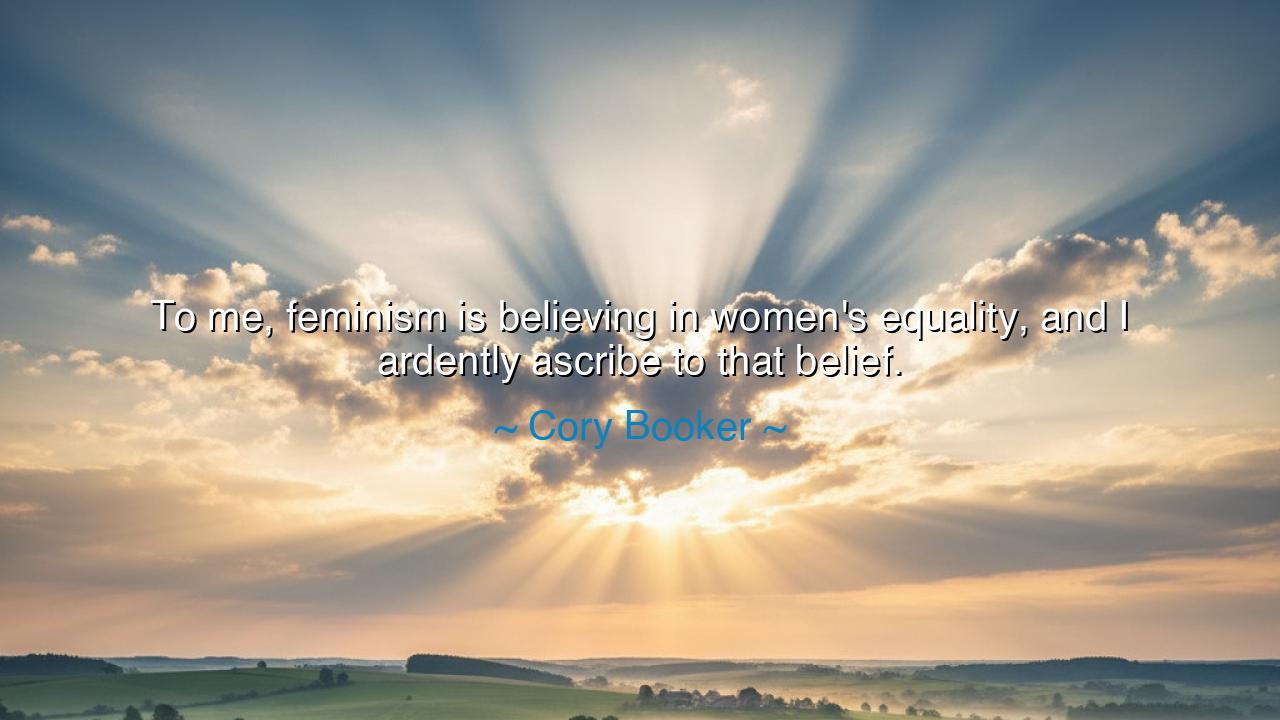
To me, feminism is believing in women's equality, and I ardently
To me, feminism is believing in women's equality, and I ardently ascribe to that belief.






Cory Booker’s words ring with the clarity of conviction: “To me, feminism is believing in women’s equality, and I ardently ascribe to that belief.” In this declaration, he strips away confusion, distortion, and fear, returning to the heart of the matter. Feminism is not a weapon against men, nor a doctrine of division; it is the simple yet powerful affirmation that women are equal in dignity, equal in worth, and equal in the right to shape their own destinies. Booker’s voice joins the chorus of those who have dared to proclaim this truth, a truth both ancient and ever new.
The ancients themselves, though often bound in patriarchal structures, whispered glimpses of this ideal. In tales of Artemisia of Caria, who commanded fleets in battle, and Hypatia of Alexandria, who taught wisdom to scholars, we see that women’s brilliance and courage were never absent from the story of humanity. Yet society often sought to bind them, to silence them, to deny what was plain to see—that they were not lesser, but equal. Booker’s words, then, are a modern echo of an eternal truth: when we honor women’s equality, we honor the fullness of humanity itself.
Consider the story of Sojourner Truth, who stood in 1851 and cried, “Ain’t I a woman?” Before a crowd that sought to deny women rights, and especially to deny them to Black women, she stood tall and unyielding. She asked why strength, labor, and intelligence in a woman should not grant her the same recognition as a man. Her question pierced the hypocrisy of her age, and her courage remains a beacon. In her defiance, we see the living embodiment of Booker’s definition of feminism—the unwavering belief that women deserve equality, not as a gift, but as a birthright.
Booker also adds his own testament: “I ardently ascribe to that belief.” His use of the word “ardently” carries heat, passion, and devotion. It is not enough, he teaches us, to quietly agree with equality in the mind while living indifferently in the world. One must ascribe to it with ardor, defend it with conviction, and practice it in daily life. This echoes the ancient teaching that belief without action is hollow, like a vessel without water. To honor equality, one must live it out—in speech, in choice, in law, and in the heart.
The significance of a man proclaiming this truth should not be lost. For too often, the burden of fighting for women’s equality has fallen upon women themselves, forced to plead for what should have been theirs by right. But when men, too, lift their voices, when they declare themselves feminists, the walls of resistance begin to crumble. Booker follows in the path of those allies who, throughout history, used their strength not to dominate but to defend. His words remind us that feminism is not the work of women alone—it is the work of all humanity.
From this, a great lesson arises: justice is indivisible. To fight for women’s equality is to fight for the liberation of all people, for oppression in one corner of humanity weakens the whole. Where women are silenced, societies lose half their wisdom; where women are shackled, humanity limps instead of running. To believe in equality is to believe in the flourishing of the whole human race. Thus, Booker’s words are not only a creed for women’s rights, but a creed for the advancement of all.
Therefore, let each soul take this teaching to heart. Do not treat feminism as a distant banner carried by others, but as a belief you must live in your own life. Speak against injustice when women are denied their due. Support their voices in workplaces, in homes, in schools, and in the public square. Teach children that equality is the natural law, not the exception. And most of all, live with ardor, as Booker does—let your belief be not cold or hidden, but fiery, visible, and constant.
Thus, from Cory Booker’s words comes an ancient yet urgent charge: to stand for women’s equality is to stand for the dignity of all humanity. To call oneself a feminist is not to divide, but to unite, for it affirms that every person, regardless of gender, carries equal worth. If we take his lesson into our lives, we will not only honor women—we will create a world where all walk as equals, free and unafraid, children of the same light.






AAdministratorAdministrator
Welcome, honored guests. Please leave a comment, we will respond soon